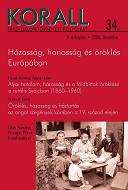Atyai hatalom, házasság és a földbirtok öröklése a rurális Svájcban (1860–1960)
Marriage and the Transmission of Land in Rural Switzerland (1860–1960)
Author(s): Anne -Lise Head-KönigSubject(s): History
Published by: KORALL Társadalomtörténeti Egyesület
Summary/Abstract: The author deals with the transfer of the family farm to the next generation and its implications for the different members of the family. With the adoption of the “code rural paysan suisse” since 1912 one inheritor has been in a position to take possession of the parental farm, excluding his older and younger siblings, either after the parents’ death or by contract whilst they were still alive. But even before then, one can find systems in some hilly parts of Switzerland which enabled only one child to take over the farm, the value of the farm being underestimated in such a manner that the share of the non-succeeding children was cut down to a minimum. We shall consider a catholic region where farms were seldom divided and where the demographic transition in the farm population occurred very late, mostly after World War I. The high average of children reaching the adult age in farm families sometimes contributed to increased tensions between parents and children and amongst the siblings who could not marry or stay on the farm. Using micro-level analyses, the paper will attempt to analyse the changes which occurred during the century under observation and the impact the process of modernisation had on the farm family. Essentially, the author concentrates on the following topics: the timing of the transmission of land (to what extent did it occur more frequently at the death of the father for the 19th century generations, but earlier in life for subsequent generations?). Were there major changes in the choice of a successor? Was the timing of marriage for the sons who get the land marriage still closely connected to the transmission of land in the middle of the 20th century? And what happened to the siblings who marry without getting any property? Finally there is the question of the retirement contracts for the old parents which were often concluded at the time of the sale of the farm to the descendant: to what extent do the contracts concluded in the middle of the 20th century still reflect the power of the older generation, especially that of the fathers over their adult sons who inherit, and this irrespective of the changes which occurred in the development of social legislation and the creation of a state pension?
Journal: Korall - Társadalomtörténeti folyóirat
- Issue Year: 2008
- Issue No: 34
- Page Range: 5-27
- Page Count: 23
- Language: Hungarian

